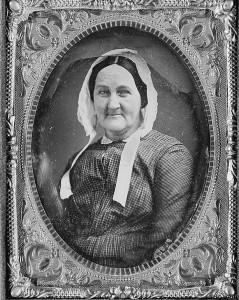Sherry Ceniza’s short article “Women as a Theme in Whitman’s Writing,” discusses the range of feminist criticism of Whitman’s Leaves of Grass. Ceniza cites both Whitman’s own work (his prose in addition to his poetry) and that of the female readers who both supported and argued against his portrayl of women. Not surprisingly, Ceniza focuses a piece of her article on the influence of Whitman’s mother, Louisa Van Velsor Whitman.
Ceniza seems to agree with biographer David Reynolds in her explanation of Louisa’s influence on her son’s work. Ceniza writes: ”She was a woman who took matters into her own hands, although her lack of formal education and the circumstances of her times seemed to work against her. She prepared the way for Whitman to listen to and admire women… “(797).
The females portrayed in Whitman’s poetry seem to fall into one of two distinct categories: domestic or unconventional. He incorporates the traditional role of a woman who remains chaste until marriage, then operates within the realm of the home in order to raise a family. This image is perhaps most closely related to Whitman’s impression of an ideal woman, namely, his mother. The second “type” is the less traditional woman who challenges the gender-based boundaries of her society. In such cases, Whitman supports the women’s movement and equality between the sexes. Whitman’s mother, however, serves to influence this type as well. Despite the fact that her role appears traditional in her son’s eyes, she is also the motivating force that encourages Whitman to embrace the voices and concerns of women.
Despite appearing as the typical domestic wife and mother, Louisa’s influence on Whitman worked in such a way that his poetry reflects these two types. Whitman’s work, therefore, represents both a respect for the past and optimism for change in the future. And, I suppose, we shouldn’t be surprised; after all, this seems to be Whitman’s approach to most American standards.

Leave a Reply